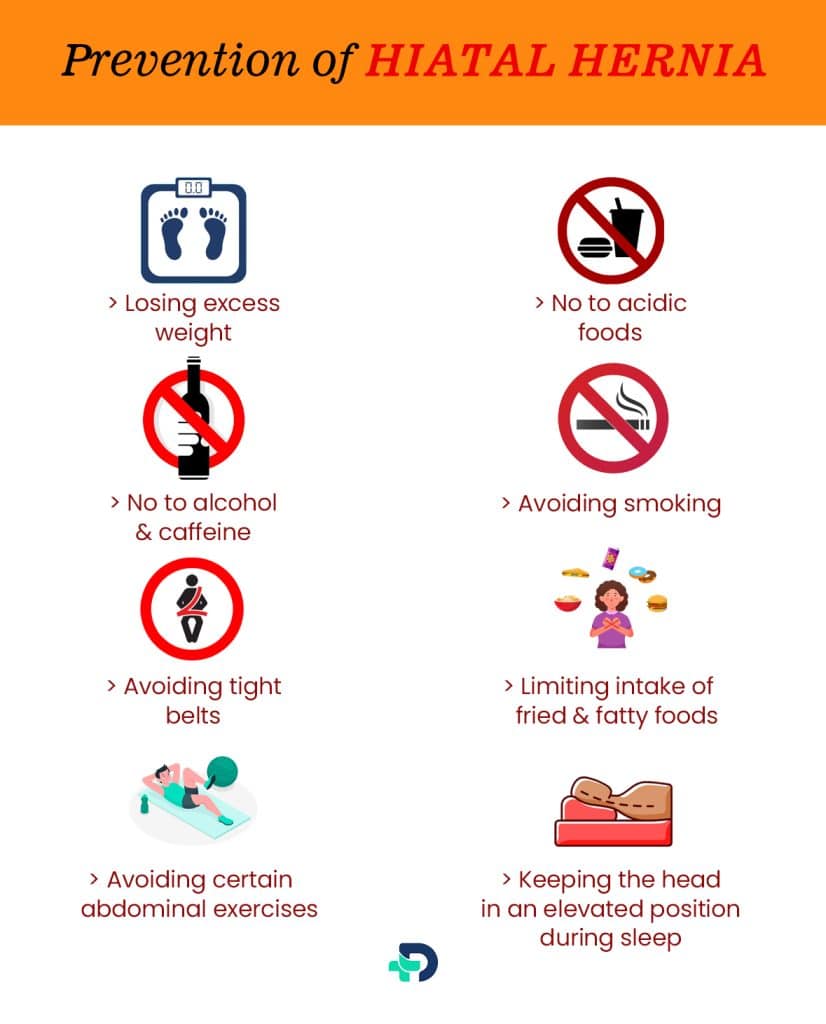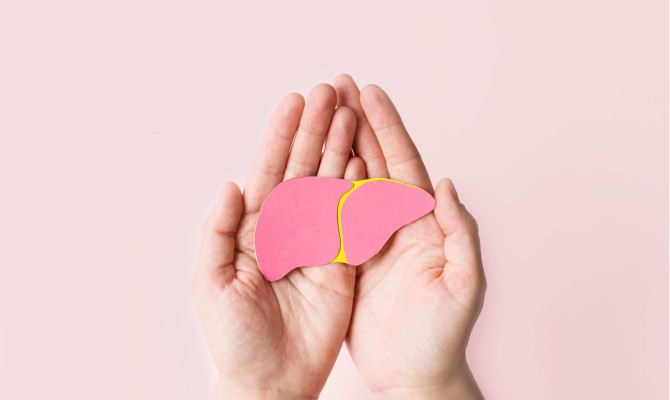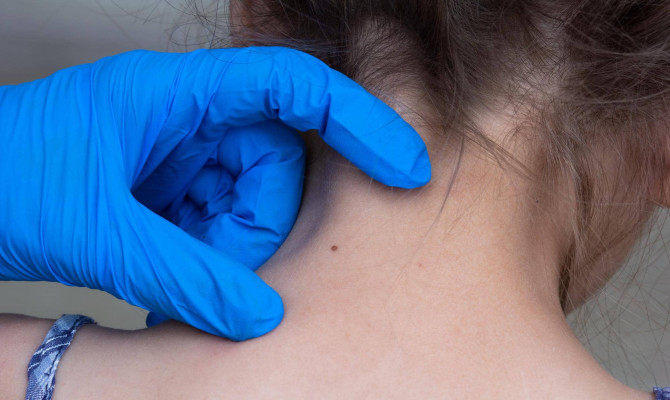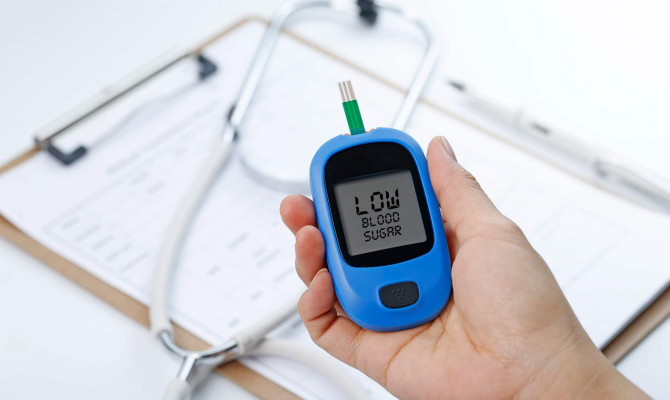Hiatal Hernia: Causes, Symptoms, and Treatment

- Hiatal Hernia
- 17 Aug 2023
Overview
What is Hiatal Hernia?
Hiatal hernia is when the top portion of the stomach bulges out through the diaphragm opening, called hiatus, into the chest area. Hiatal hernia can happen at any age or to any gender. Occasionally, Hiatal hernia does not cause any problems and also does not require treatment. But in some cases, the stomach contents return to the esophagus causing various symptoms, including heartburn.
One can effectively treat mild symptoms with self-care and medications, but severe symptoms might require surgery to resolve the issue.

Prevalence
- The Hiatal hernia incidence increases with age, and around 60% of individuals over 50 might have a Hiatal hernia.
- Hiatal hernia is more prevalent in Western Europe and North America but rare in African communities.
- Although Hiatal hernia is common, only 10% of the affected individuals experience noticeable symptoms 1Overview| Researched based study from Sciencedirect.com
Types
Types of Hiatal Hernia
The two main types of Hiatal hernia are as follows:
- Fixed Hiatal hernia
- Sliding Hiatal hernia
Fixed Hiatal Hernia
- In a fixed Hiatal hernia, the stomach’s upper part pushes through the diaphragm and remains there. In most cases, it is not severe, but there is a risk that the stomach’s blood flow could get blocked, leading to severe damage and medical urgency.
- The condition is rare and is known as a paraoesophageal hernia.
Sliding Hiatal Hernia
- Sliding Hiatal hernia is the most frequent type and occurs when the esophagus and the stomach slide into and protrude out of the chest area through the hiatus.
- The condition usually does not cause symptoms and may resolve without treatment 2Types| Researched based study from Nlm.nih.gov
Symptoms
Symptoms of Hiatal Hernia
Most people with Hiatal hernias, including fixed Hiatal hernias, don’t notice any symptoms. However, some might experience the following symptoms:
- Heartburn that worsens when one lies down or lean
- Chest pain
- Difficulty swallowing
- Acid reflux (stomach acid flows back into the esophagus)
- Backflow of food and liquid into the mouth
- Burping (expelling gas through the mouth)
- Stomach gas (bloating)
- Upset stomach
- Nausea and vomiting
- Shortness of breath
- Unpleasant taste in the mouth
- Passing black stool 3Symptoms| Researched based study from Nlm.nih.gov
Causes
Causes of Hiatal Hernia
The exact cause that leads to structural weaknesses causing Hiatal hernia is unclear to date.
However, the most probable cause of Hiatal hernia are:
- Damage or injury that weakens the muscle tissue
- Repeated excess pressure on the stomach muscles during vomiting, coughing, lifting heavy loads, and straining during bowel movements
- Physical strenuous exercise that puts pressure on the abdomen
- Changes in the diaphragm with age
- Unusually huge diaphragm at birth( in rare cases)
- Extra fluid buildup in the abdomen 4Causes| Researched based study from Nlm.nih.gov
Diagnosis
Diagnosis of Hiatal Hernia
To diagnose a Hiatal hernia, the doctor might perform the following test:
Barium swallow test
- It is an imaging test to check problems in the esophagus, stomach, throat, and parts of the small intestine.
- The test involves drinking the barium liquid followed by an X-ray. It gives the doctor a complete picture of the stomach disorders, tumors, and ulcers in the esophagus.
Endoscopy
- The doctor inserts a thin long tube called the endoscope into the throat.
- The camera attached to the tube lets the doctor get a clear picture of the esophagus and the stomach.
Esophageal manometry
- Esophageal manometry checks the proper working of the esophagus
- During the test, the doctor inserts a pressure-sensitive tube through the nose into the esophagus and stomach.
- It evaluates the coordinated muscle movement of the esophagus
pH test
- The pH test measures the acid levels in the esophagus from the stomach during 24 hour period.
- It is performed to evaluate the effectiveness of heartburn treatment
Gastric emptying test
- The gastric emptying test is a test to determine how quickly the food leaves the stomach.
- It determines if the stomach muscles are working properly
- It is recommended for patients with frequent vomiting and abdominal pain to determine other causes besides Hiatal hernia 5Diagnosis| Researched based study from Nlm.nih.gov
Risk factors
Risk factors of Hiatal Hernia
The risk factors that weaken the diaphragm’s opening through which the esophagus (food pipe) passes are as follows:
- Increased weight (Obesity)
- Advanced age (50 years and above)
- Smoking
- Certain surgical operations involving the food pipe
- Genetic factors leading to a congenital anomaly in the diaphragm 6Risk factors| Researched based study from Nlm.nih.gov
Complications
Complications of Hiatal Hernia
GERD
- In some cases, Hiatal hernia can lead to GERD (Gastroesophageal reflux disease). It is a persistent condition when the stomach acids leak back into the esophagus.
Lung infections such as pneumonia
- It occurs when stomach content moves up to the lungs
Strangulated hernia
- A strangulated hernia is when the stomach is squeezed tightly, and the blood supply is cut off.
- It is a fatal condition and needs prompt medical attention.
Iron deficiency anemia
- Iron deficiency anemia is when blood lacks adequate healthy red blood cells.
- It occurs in case of large hernia 7Complications| Researched based study from Nlm.nih.gov
Treatment
Treatment of Hiatal Hernia
Most Hiatal hernia does not require treatment. The presence of heartburn symptoms is treated with medications. If medication does not work, surgery is recommended in some cases.
Medications
Over-the-counter antacid (neutralizes stomach acid)
- Pantoprazole
- Rabeprazole
- Esomeprazole
Proton pump inhibitors (prevent acid production)
- Lansoprazole
- Omeprazole
H2-receptor blockers (lowers acid production)
- Cimetidine
- Nizatidine
- Famotidine
Surgery
Hiatus repair surgery
- It is done by tugging the stomach to move into the abdomen and making the diaphragm opening smaller.
- The procedure might also restructure the esophageal sphincter and eliminate the hernial sacs.
Collis Nissen gastroplasty
- It is a surgical procedure to lengthen the esophagus in severe Hiatal hernia cases in which the esophagus has shortened.
- In the operation, the surgeon uses tissues from the upper part of the stomach to extend the esophagus.
Nissen Fundoplication
- The surgery tightens by stitching the upper part of the stomach, i.e., the fundus, with the bottom portion of the esophagus to hold the stomach in place below the diaphragmatic hiatus.
- The stitches create pressure at the esophagus end and prevent acid reflux 8Treatment| Researched based study from Nlm.nih.gov
Lifestyle modification tips for Hiatal Hernia
- Regular exercise to manage weight
- Managing stress by taking regular relaxing walks and practicing yoga
- Drinking plenty of water and staying hydrated
- Keeping a note of the triggered acidic foods and avoiding them
- Eating slowly and drinking plenty of water with meals
- Eating enough fiber foods
- Avoiding eating before exercise
- Wearing loose- fitting comfortable clothing
- Taking probiotics(live beneficial bacteria in some supplements and foods)
- Using a small amount of healthy cooking oils such as olive oil, coconut oil
- Avoiding fasting as well as overeating
- Eating only whole foods instead of refined foods
- Drinking a small quantity of diluted apple cider vinegar before meals 9Treatment| Researched based study from Nlm.nih.gov
Seek medical attention if one with a Hiatal hernia has the following symptoms:
- Severe pain in the chest and belly
- Vomiting
- Can’t pass gas and can’t defecate
- Long-term upset stomach 11Treatment| Researched based study from Nlm.nih.gov
Prevention

Prevention of Hiatal Hernia
It is quite difficult to prevent a Hiatal hernia. However, some of the ways to reduce the risk and minimize the symptoms are as follows:
- Losing excess weight
- Eating meals in small sizes several times instead of one big meal
- Avoiding straining during bowel movements
- Avoiding certain abdominal exercises
- Avoiding tight belts
- No to acidic foods
- No to alcohol and caffeine
- Avoiding smoking
- Limiting intake of fried and fatty foods
- Avoiding sleeping just after meals and waiting for at least three to four hours before lying down
- Keeping the head in an elevated position during sleep10Prevention| Researched based study from Nlm.nih.gov
Food to avoid for Hiatal Hernia
Avoiding certain foods might reduce some of the symptoms of Hiatal hernia, such as stomach gas (bloating), heartburn, and acid reflux. Some foods to avoid are listed below:
- Fatty food
- Salty foods
- Spicy food
- Processed food
- Red meat
- Garlic
- Onions
- Cucumbers
- Tomatoes
- Citrus fruits
- Chocolate
- High-fat dairy products
- Sweetened juices
- Bread and cereals
- Mint products such as candies and peppermint
- Caffeine
- Alcohol
- Soft drinks and carbonated beverages 12Prevention| Researched based study from Nlm.nih.gov
Takeaway
Key Takeaways
- Hiatal hernia is a common disease in which the stomach bulges through the diaphragm.
- Hiatal hernia symptoms are rare, with only some experiencing heartburn and acid reflux.
- Most Hiatal hernia risk factors, such as genetic factors, are unavoidable
- Obesity and lifestyle modification can well manage Hiatal hernia
- Doctors might recommend surgery in severe cases of Hiatal hernia
Any feedback on this article?
 This Articles content was accurate
This Articles content was accurate Very Informative Article
Very Informative Article I have a question or a comment
I have a question or a comment
 This article contains inaccurate content
This article contains inaccurate content This article was not helpful
This article was not helpful I have a question or a comment
I have a question or a comment
We appreciate your helpful feedback!
Checkout our social pages
References
-
Science Direct
Hiatus Hernia | Overview
-
National Library of Medicine
Find Out the Differences by Types of Hiatal Hernia! | Types
-
National Library of Medicine
Hiatal Hernia | Symptoms
-
National Library of Medicine
Clinical Significance of Hiatal Hernia | Causes
-
National Library of Medicine
The management of hiatal hernia: an update on diagnosis and treatment | Diagnosis
-
National Library of Medicine
Risk factors in the aetiology of hiatus hernia: a meta-analysis | Risk factors
-
National Library of Medicine
Gastric Volvulus: A Complication of Hiatal Hernia | Complications
-
National Library of Medicine
Modern diagnosis and treatment of hiatal hernias | Treatment
-
National Library of Medicine
Lifestyle intervention in gastroesophageal reflux disease | Treatment
-
National Library of Medicine
Hiatal hernia repair: prevention of mesh erosion and migration into the esophagogastric junction | Prevention
-
National Library of Medicine
Emergent Repair of Paraesophageal Hernias and the Argument for Elective Repair | Treatment
-
National Library of Medicine
Foods Inducing Typical Gastroesophageal Reflux Disease Symptoms in Korea | Prevention






































